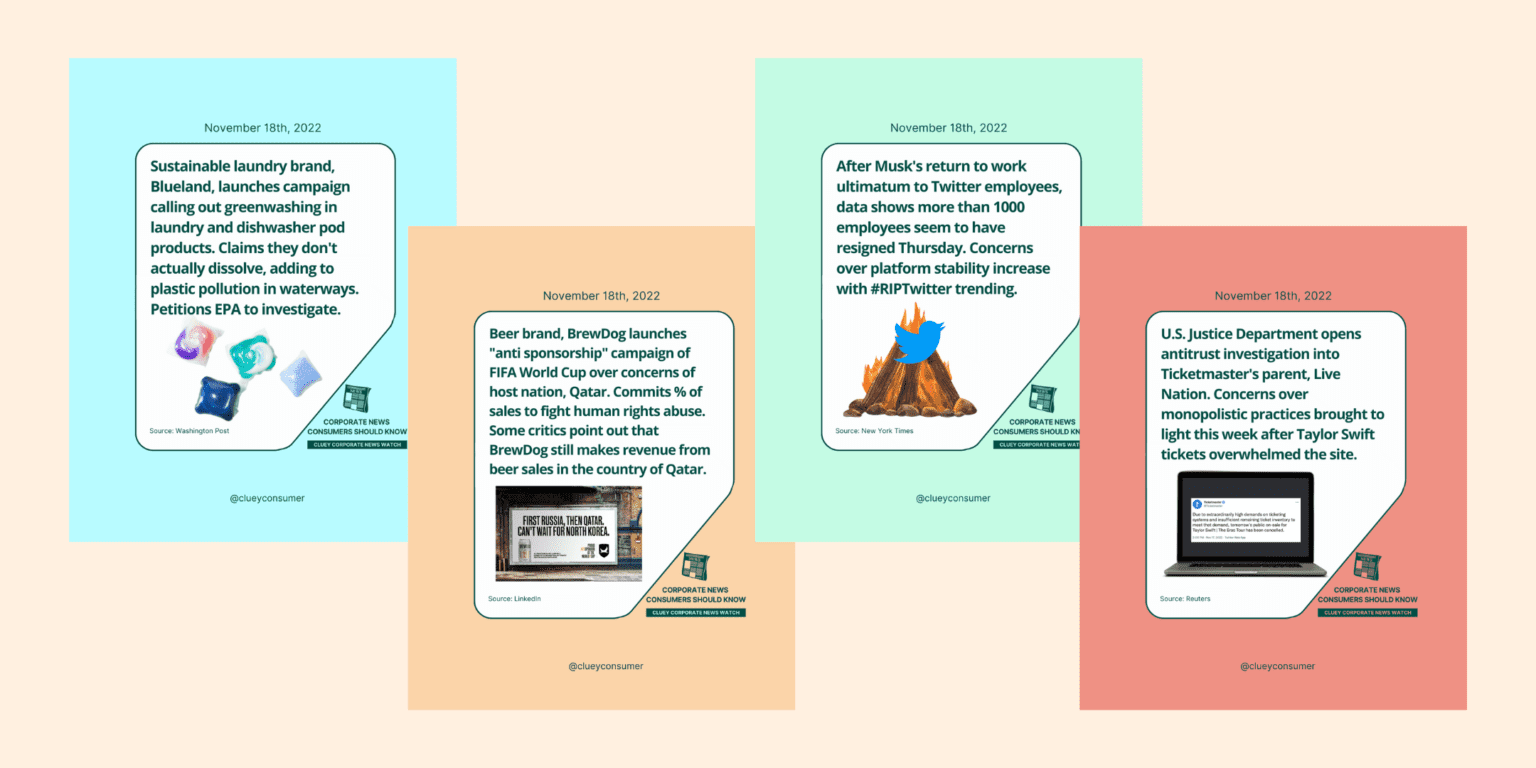By Maryclaire Manard
It’s been quite the week in the world of news consumers should know. We break down the four biggest stories.
Story 1: Are Laundry Pods Polluting our Waterways?
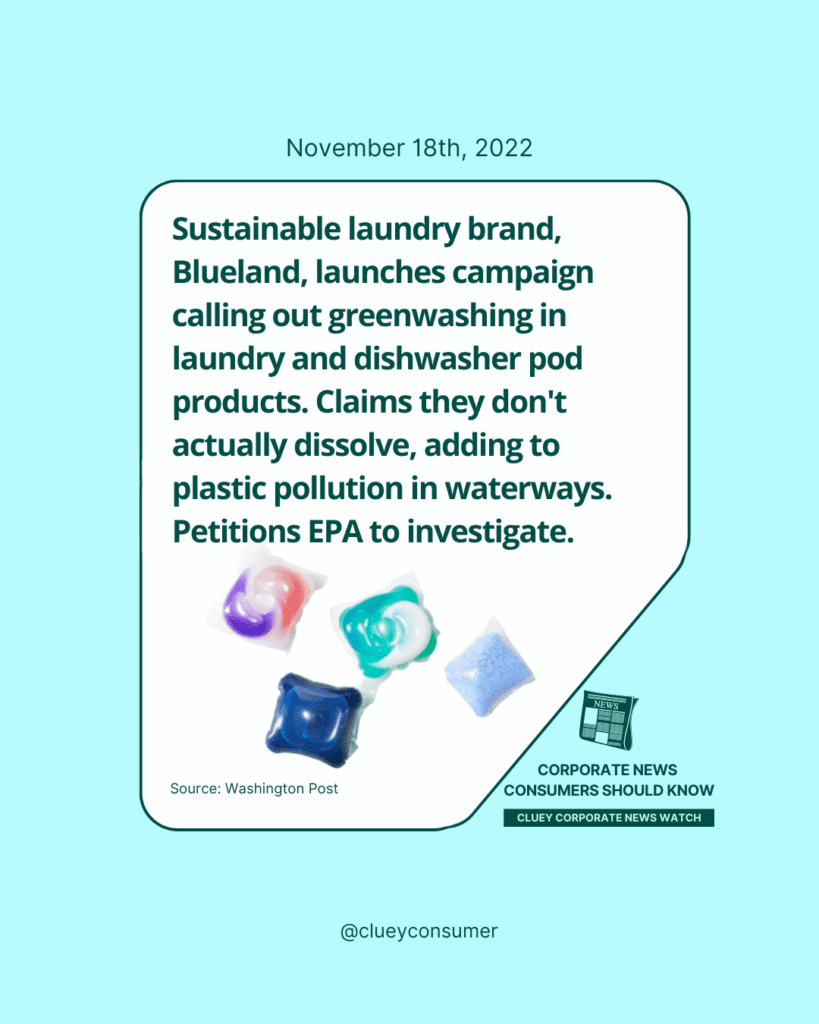
This week, Blueland, a brand that makes sustainable cleaning products, launched a marketing campaign alongside a commissioned research report and a petition to the EPA against the use of dissolvable laundry pods, dishwasher pods, and dissolvable laundry sheets.
The campaign and report from Blueland claims that the main ingredient used to make the dissolvable outer-membrane of these pods, Polyvinyl alcohol (also called PVA or PVOH), does not appropriately dissolve in wastewater treatment centers as it’s supposed to after going down consumer household drains, ultimately polluting oceans and waterways as micro-plastic waste. As part of their petition to the EPA, which currently lists PVA/PVOH as a “Safer Choice” and “Safer Chemical Ingredients” compound, Blueland is asking the EPA to remove those labels until further research can be conducted.
Blueland’s founder, Sarah Paiji Yoo, who started Blueland with ‘dry-form’ dissolvable tablets for cleaning products, makes the point in the campaign that just because PVA is ‘water soluble’ that doesn’t mean it is completely eliminated (making the analogy of how salt, when dissolved in water, can still be tasted even if not seen). Given PVA is a synthetic polymer, she notes, that still classifies it as a petroleum-based plastic. Worse even, is that unlike standard liquid detergent that comes in plastic jugs that may be recycled or thrown in the trash, the plastic contained in these pods and sheets are designed to go down our drains and ultimately into waterways.
The Blueland commissioned research report, conducted by industry experts, has a main claim for the EPA petition which states that previous research determining PVA as a safer and more sustainable option, accounts for the pods being in wastewater treatment centers long enough to be broken down by micro-organisms present in the plants for this purpose. Their report estimates that a whopping 75% of PVA from laundry and dishwasher pods remain intact after going through the standard waste treatment process.

The campaign and accompanying report deals a particularly impactful blow to many “sustainable alternative” laundry brands who use PVA to make pods and sheets as a more eco-friendly choice against mainstream liquid detergent brands. For conscious consumers, this includes impacting products from brands like dropps, tru earth, earth breeze, and more. Even many product review sites and blogs that offer “sustainable swap suggestions” to readers have been promoting these brands and products for some time now, and may need to reverse course on their previous recommendations to consumers.
MonoSol, the company that manufactures this compound for use in consumer products, along with an industry trade group shot back a fierce reply to the report, accusing Blueland of a “publicity stunt” for their own “commercial gain.” They reiterate previous research that indicates this compound to be safe and sustainable. They’re not alone in these claims, as previously noted, the EPA has had the compound on their “safe choice” list for some time, and even the Environmental Working Group has listed PVA as “low-hazard.”
Given the conflicting nature of the debate, Cluey’s official stance is: The jury is still out on whether or not consumers should chuck their pods right now, but bravo to Blueland for bringing this important new research to light. We fully support the nature of the petition to request that the EPA conduct additional third-party research based on the claims in Blueland’s report. For consumers who are concerned about this, and want to find an alternative today, we recommend the following products which all come from top rated brands on our insights-driven platform:
- Top choice for highest impact: Meliora Laundry Powder
- Mainstream options for buying on Amazon or major retailers (make sure to only select the standard liquid detergent options, and not the pods or sheets): Seventh Generation and all.
To read more on this story, check out the Washington Post’s coverage here, and the full Blueland report here.
Story 2: BrewDog’s “anti sponsorship” of FIFA’s World Cup… and the backlash
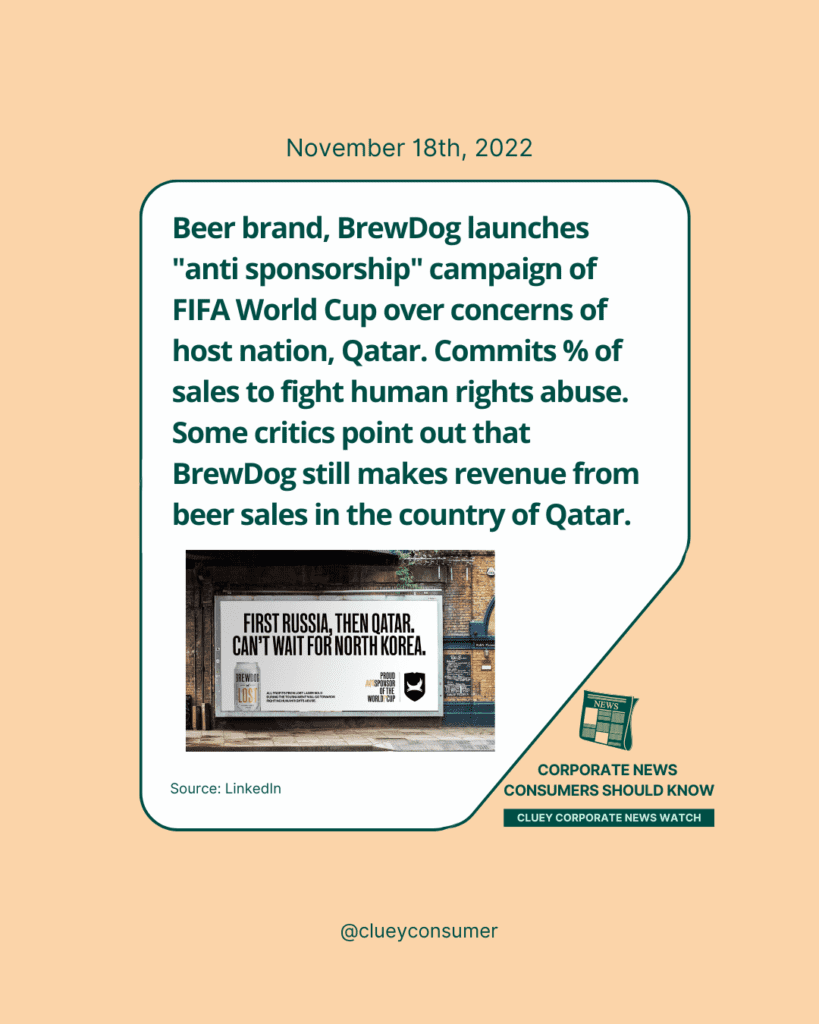
Craft beer brand, BrewDog has launched a major advertising campaign claiming to be an anti-sponsor to the upcoming FIFA World Cup this weekend over concerns of major human rights violations by the tournament’s host nation of Qatar.
Qatar is being criticized on the world-stage not only for having restrictive and penalizing laws against members of the LGBTQ+ community in the country, but also for the reported deaths of thousands of migrant workers who built facilities for the upcoming games. Many blame corruption on the FIFA organization for Qatar winning the bid to host this year’s games.
In response, brands like BrewDog have decided to speak out. In BrewDog’s case, this includes launching a campaign for a portion of their beer sales to go towards fighting human rights’ abuses. See the CEO’s LinkedIn post here:
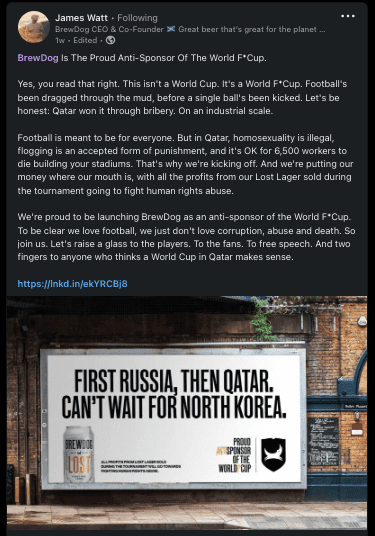
Not all were pleased to see the campaign from BrewDog, with some critics rightly pointing out the hypocritical nature of BrewDog still making revenue from sales of beer sold in the country of Qatar. View one of the responses here.
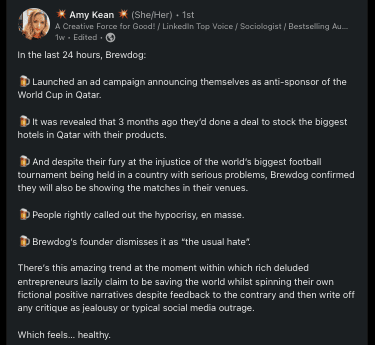
Story 3: What the f*&%$ is going on at Twitter right now? Mass resignation spurs #RIPTwitter Hashtag to trend over concerns of the platform’s stability.
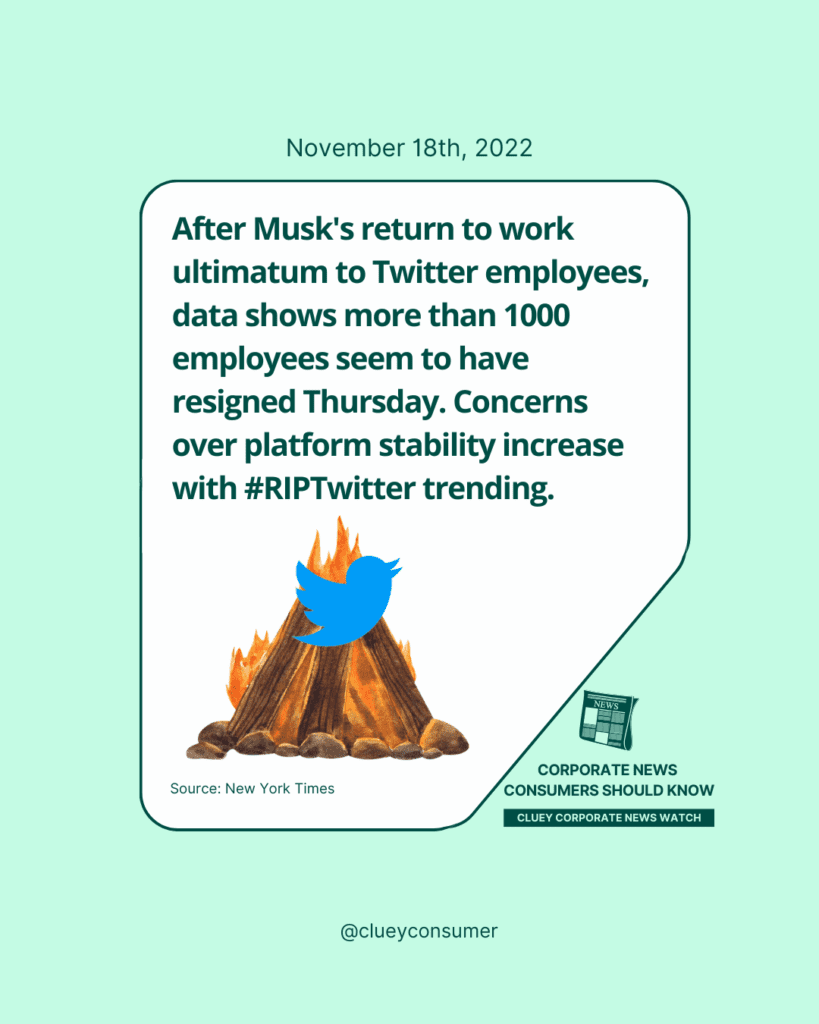
It has been reported that another 1,200 employees parted ways with Twitter yesterday, following an ultimatum by its new owner and CEO, Elon Musk. Read more from the New York Times on the latest regarding Twitter, employee resignations, and Elon Musk.
Story 4: Ticketmaster, Taylor Swift, and the U.S. Department of Justice
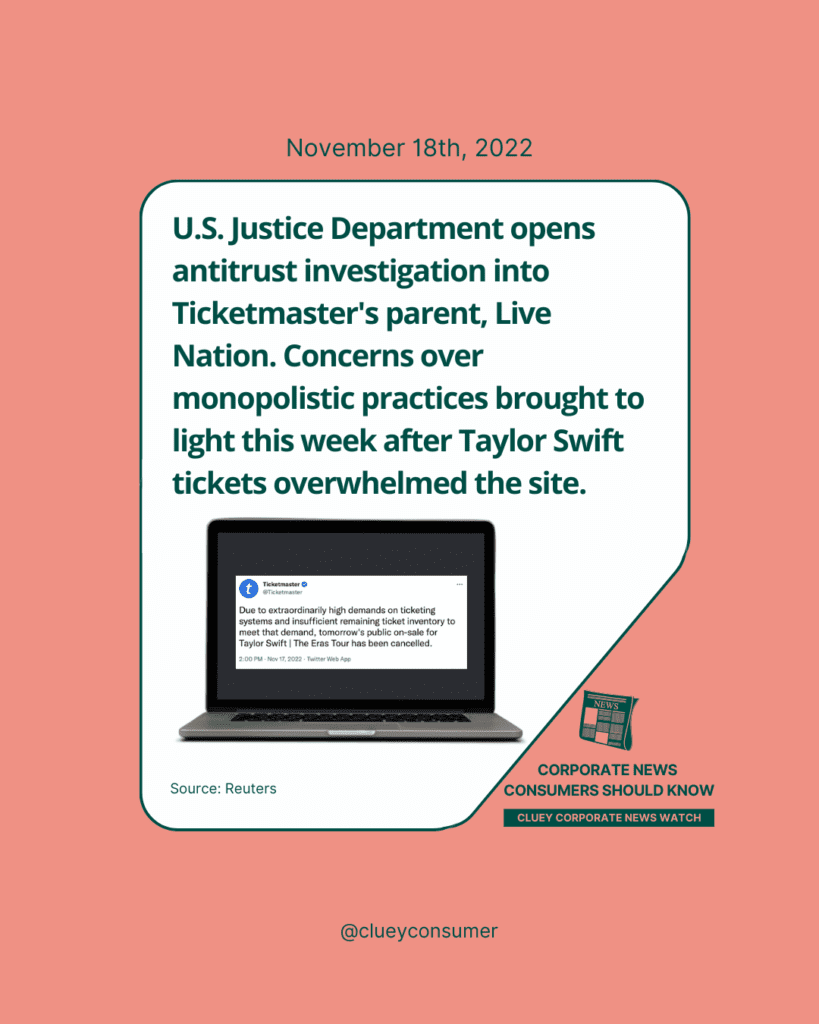
Read more about this developing story on Ticketmaster here. (Reuters)
That’s it for this week’s big stories! Come back next week to keep up with the latest in conscious consumer news, and don’t forget to sign up for Cluey’s newsletter to get more on conscious consumer tips and brand swaps from Cluey.
